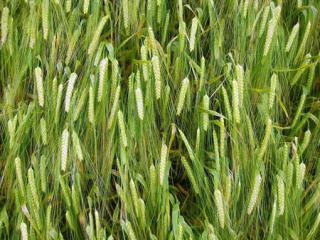Latest Briefing in Climate, water and energy

Integrated Disease Management in Spring Barley
Intergrated Disease Management (IDM) could help greatly reduce the volume of crops lost to disease in Scotland, contributing to our future food security. It works by integrating plant resistance, fungicides, cultural methods such as appropriate use of fertilisers, and newer, innovative approaches, to provide effective and sustainable disease control.
In Scotland, barley is the second most important crop after grass, with nearly 300,000 ha grown in 2012, with a net value of £315 million. Diseases represent a major constraint to barley production globally, despite considerable effort to control the pathogens responsible. The ability of pathogens to overcome host resistance, development of pathogen insensitivity to fungicides, and the increasing importance of pathogens thought previously to be of minor significance, means that diseases will continue to pose a threat to global barley production.
These constraints, coupled with increasing legislation aimed at protecting the environment, have led to increased efforts to find more sustainable approaches to disease control. Such approaches clearly need to balance protecting the crop from threats such as diseases, pests and weeds, with the need to minimise environmental damage, and requires an integrated approach to crop protection.
IDM represents such an approach and is a continuously improving process in which innovative solutions are integrated and adapted locally by growers. By offering a broad spectrum, integrated approach to disease control, IDM will contribute to reducing reliance on pesticides in agricultural systems.
Read morePublished on 16 December 2014 in Climate, water and energy , Ecosystems and biodiversity , Food, health and wellbeing
Recent Briefings in Climate, water and energy
The Impact of Animal Health Status on Greenhouse Gas Emissions from Livestock
Ruminant livestock production is a key contributor to the rural and national economy of Scotland, as well as the world-renowned Scottish Food and Drink industry. Read more
Published on 8 July 2014 in Climate, water and energy , Food, health and wellbeing
The Journey from Genes to Plant Traits Reveal a Flexible Response to a Changing Environment
To address the challenges brought about by the impact of climate change and our increasing reliability on plant based food, fuel and materials, requires an understanding of molecular processes that underlie crop responses to environmental stresses. Read more
Published on 1 May 2014 in Climate, water and energy , Food, health and wellbeing
Flood Inundation Modelling and Visualization: Application for Natural Flood Management
Natural Flood Management (NFM) is generally defined as the alteration, enhancement, restoration or utilisation of natural landscape features and characteristics as a way of reducing flood risk. Read more
Published on 24 February 2014 in Climate, water and energy
Biofuels from Cereal Straw
Sustainably produced second generation bio-fuels (and associated co-products) from cereal straw could lead to reduced greenhouse gas (GHG) emissions, contribute to national energy security and lead to growth and jobs, particularly in the agricultural and renewable energies sector. Read more
Published on 29 January 2014 in Climate, water and energy
Breeding For Climate Change: Future-Proofing The Scottish Potato Industry
The ability to adapt potato to withstand multiple pest, pathogens and environmental stresses is critical to its future growth as a major food source. Read more
Published on 27 January 2014 in Sustainability and Communities , Climate, water and energy , Food, health and wellbeing
Investigation Barriers to the Uptake of Nitrogen Use Efficiency in Scottish Agriculture
Nitrogen Use Efficiency (NUE) has been an explicit goal in agricultural policy for a number of decades. Read more
Published on 17 December 2013 in Climate, water and energy
Roots for Sustainability
An understanding of the interactions between roots and the soil is fundamental to food security, human nutrition and environmental sustainability. Read more
Published on 30 July 2013 in Sustainability and Communities , Climate, water and energy , Food, health and wellbeing
Ovine Pulmonary Adenocarcinoma - A Major Animal Health Concern for Scottish Sheep Farming
Ovine Pulmonary Adenocarcinoma (OPA) , an infectious lung cancer in sheep, has a major economic on farming. Read more
Published on 26 June 2013 in Sustainability and Communities , Climate, water and energy , Ecosystems and biodiversity , Food, health and wellbeing
Climate Change and Animal Welfare: The Good and the Bad
In recent years, the impact of climate change on our environment has become the subject of much debate. Read more
Published on 2 May 2013 in Climate, water and energy
Renewable Energy and Water Resource Inter-relations
Scotland is committed to achieving substantial increases in the proportion of energy from renewable sources. Read more
Published on 7 March 2013 in Climate, water and energy







